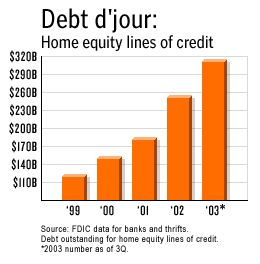BEND, Ore. (CNN/Money) -
For American consumers addicted to spending, the home equity line of credit looks to be the drug of choice.
As of the third quarter this year, homeowners had $315 billion in outstanding debt from home equity lines of credit (HELOCs), according to the Federal Deposit Insurance Corporation, a 31 percent increase from the same time last year.
"For some people a home equity line of credit is a brand new shovel for digging themselves further into debt," said Keith Gumbinger, vice president for HSH Associates.
The average line of credit available as of June 2003 was about $69,500, according to a survey by the Consumer Bankers Association. Homeowners with lines of credit drew down 3.7 times for the year, taking out $13,142 each time, on average.
"Lenders are allowing people reasonably unfettered access to their equity," said Gumbinger, noting that banks are increasingly offering lines of credit at the time of closing on a first mortgage.

Unlike home equity loans, which pay one lump sum and have a fixed repayment schedule, HELOCs let homeowners tap their equity as they see fit by either writing a check linked to the account or, more recently, by using a credit card.
There is no set repayment schedule, and minimum payments are typically no more than the monthly interest on the loan.
But for all of their advantages, lines of credit demand a great deal of self-control on the part of the homeowner.
What's the worst that could happen?
Right now may be the best of all times to borrow from equity. Home prices are high and interest rates on HELOCs are low, averaging 4.7 percent, according to HSH Associates.
To add to the bargain, homeowners can in most cases deduct any interest they pay for these loans or lines of credit, regardless of how they use the money.
(If you're subject to the alternative minimum tax you can deduct only interest related to the home.)
But this is exactly why you should borrow with care. "Leveraging yourself out at a time when (home) prices are very high certainly could set you up for difficult times," said Gumbinger.
Indeed, if the market value of your house declines, you could end up owing more on your house than it is worth.
In some severe cases, homeowners have been forced into foreclosure because they could not make the minimum payments due on their home equity.
Even if you don't suck out all of the equity in your house, you could be stuck paying a higher interest rate than you initially bargained for.
That $20,000 you borrowed to remodel your kitchen may only cost you 4 percent in interest right now, but there's no guarantee that rates won't change.
And rates on lines of credit are almost always variable.
If you're worried about rates going up, you could convert that debt to a home equity loan with a fixed rate and a fixed monthly payment. But, you'll pay a higher interest rate (the average rate is now 7 percent) and your monthly payments will increase appreciably.
Also, you may have to pay an early-termination fee on your line of credit, possibly in the hundreds of dollars.
A better bet might be to aggressively pay down your line of credit while rates are still low, said Gumbinger.
While you're at it, take a second look at the interest rate for your line of credit.
If it's more than prime plus 1 percent, shop around for a better deal or request a lower rate from your current lender.
Prime plus 0 percent is common these days, added Gumbinger, and some lenders are even offering "prime minus" deals.
Self control may not be enough
Just as diet experts recommend keeping fatty foods out of the refrigerator, credit experts recommend keeping home equity out of hands' reach.
When your bank extends you the line of credit at your mortgage closing, consider declining. You can always get a line of credit when you need one, added Gumbinger, and you'll probably get a better rate by shopping around on the open market rather than taking what's offered by your lender.
What's more, you don't have to accept the full amount given to you. "If you don't trust yourself with that much credit, you should ask that the limit be reduced," said Fritz Elmendorf of the Consumer Bankers Association.
| Real Estate Resources
|

|
|
|
|
Once you do get a line of credit, consider declining any credit card attached to the account and keep the corresponding checkbook in a safety deposit box or other spot that will force you to think before you borrow.
"There are times when it's very appropriate to borrow against your home equity," said Elmendorf. Borrowing to make home improvements or pay education costs are appropriate to uses of home equity, he said.
It might also make sense to use home equity to consolidate credit card debt -- assuming you don't turn around and charge more, as many people do.

|

